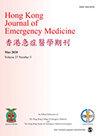Predictive factors for prolonged hospitalisation in acute pyelonephritis patients admitted to the emergency medicine ward
IF 0.8
4区 医学
Q4 EMERGENCY MEDICINE
引用次数: 0
Abstract
Background: Acute pyelonephritis is a bacterial infection of the upper urinary tract. Patients can be admitted to a variety of wards for treatment. However, at the Prince of Wales Hospital in Hong Kong, they are managed initially in the emergency medicine ward. The aim of the study is to identify the risk factors that are associated with a prolonged hospital length of stay. Methods: This was a retrospective cohort study conducted in Prince of Wales Hospital. The study recruited patients who were admitted to the emergency medicine ward between 1 January 2014 and 31 December 2017. These patients presented with clinical features of pyelonephritis, received antibiotic treatment and had a discharge diagnosis of pyelonephritis. The length of stay was measured and any length of stay over 72 h was considered to be prolonged. Results: There were 271 patients admitted to the emergency medicine ward, and 118 (44%) had a prolonged hospital length of stay. Univariate and multivariate analyses showed that the only statistically significant predictor of prolonged length of stay was a raised C-reactive protein (odds ratio 1.01; 95% confidence 1.01–1.02; p < 0.0001). Out of 271 patients, 261 received antibiotics in the emergency department. All 10 patients (8.5%) who did not receive antibiotics in emergency department had a prolonged length of stay (p = 0.0002). Conclusion: In this series of acute pyelonephritis treated in the emergency medicine ward, raised C-reactive protein levels were predictive for prolonged length of stay. Patients who did not receive antibiotics in the emergency department prior to emergency medicine ward admission had prolonged length of stay.急诊病房急性肾盂肾炎患者长期住院的预测因素
背景:急性肾盂肾炎是一种上尿路细菌感染。病人可以住进不同的病房接受治疗。然而,在香港的威尔斯亲王医院,他们最初是在急症病房管理的。该研究的目的是确定与延长住院时间相关的风险因素。方法:在威尔斯亲王医院进行回顾性队列研究。该研究招募了2014年1月1日至2017年12月31日期间入住急诊病房的患者。这些患者具有肾盂肾炎的临床特征,接受抗生素治疗,出院诊断为肾盂肾炎。测量停留时间,任何超过72小时的停留时间都被视为延长。结果:急诊科住院271例,延长住院时间118例(44%)。单因素和多因素分析显示,c反应蛋白升高是延长住院时间的唯一有统计学意义的预测因素(优势比1.01;95%置信度1.01-1.02;p < 0.0001)。271名患者中,261人在急诊科接受了抗生素治疗。未在急诊科使用抗生素的10例患者(8.5%)住院时间均延长(p = 0.0002)。结论:在急诊病房治疗的一系列急性肾盂肾炎患者中,c反应蛋白水平升高预示着住院时间延长。急诊病房入院前未在急诊科接受抗生素治疗的患者住院时间延长。
本文章由计算机程序翻译,如有差异,请以英文原文为准。
求助全文
约1分钟内获得全文
求助全文
来源期刊

Hong Kong Journal of Emergency Medicine
EMERGENCY MEDICINE-
CiteScore
1.50
自引率
16.70%
发文量
26
审稿时长
6-12 weeks
期刊介绍:
The Hong Kong Journal of Emergency Medicine is a peer-reviewed, open access journal which focusses on all aspects of clinical practice and emergency medicine research in the hospital and pre-hospital setting.
 求助内容:
求助内容: 应助结果提醒方式:
应助结果提醒方式:


